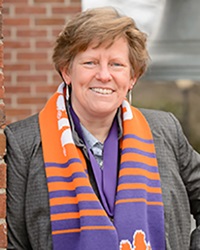The following is a guest blog post from Clemson University's June J. Pilcher, who has served as a Sigma Xi Distinguished Lecturer and was awarded Society Fellowship in 2022.

As a child growing up in the 60s and 70s, I was a tomboy before being a tomboy was acceptable. I dared to play tag with the little boys during recess instead of jacks with the other little girls. This concerned the teachers and principal at my elementary school so much that they talked to my mother. Fortunately, she told them not to worry about it. I had three older brothers at home and playing with boys was normal for me. But it was also my mother who repeatedly told me that I couldn’t do what my brothers could do.
Things have changed. More girls are pursuing careers, advanced degrees, and a redefined work/life balance. Yet, women in science are still cited less often than men, receive less funding than men, are more likely to be adjunct lecturers or full-time lecturers than men, and are less often seen in leadership roles than men. And, yes, “mansplaining” continues. As a Biopsychologist, I realize that these female-male inequalities are difficult to overcome, in part, because of lingering disparities in the culture of our work environments. Fortunately, our big human brains make it possible for us to recognize what is happening and develop plans to address the ongoing inequities between women and men scientists.
Universities, research institutes, and research societies are implementing programs to help address the disparities between women and men. New mentorship programs and programs in diversity are being implemented. However, there are also approaches that we can take as individuals, especially as newer scientists, to help ourselves and our institutions.
-
Remember that we are capable and “smart enough.” Women are more likely to feel like imposters instead of viewing themselves as capable and deserving of their position. We don’t have to think that we are the smartest person in the room. We just need to be smart enough and keep taking steps toward our goals.
-
Remember to listen and absorb the ideas and feedback that work for us, and discard the ideas and feedback that hold us down. Many other scientists will expect less of us and will view our accomplishments as being less because we are women, we don’t have to allow those expectations or perceptions to change our effort or change our goals.
-
Remember not to wait for support or recognition and ask for support when needed. Women scientists often receive less support and recognition for their efforts than men. We can’t wait for positive feedback, even when it is well-deserved. We must keep moving forward. It can also be important to ask for support, for example, when asking for recommendations for a fellowship application or assistance with grant proposals.
-
Remember to use our strength to help propel ourselves and others forward. Our teams accomplish more when we encourage everyone to contribute to their fullest. We can help to bring everyone on board as workers committed to excellence, not just as passengers along the way.
-
Remember to say “no.” Women are asked to help on more committees and other types of tasks that may distract them from their main scientific effort. We should accept if the committee or task could be interesting or useful, but we must be willing to say no to help control our own time and effort.
I wish that scientists were talking about these ideas and issues when I was new on the scene. There were slightly increasing numbers of women in graduate school back then (particularly in psychology), but the expectation for women was different. Assumptions were made that we would just get married to another graduate student and start a family. Or perhaps, we would become teachers, but not academics. Not scientists. Don't let others’ expectations change you or change your goals. There is so much research to be done, so many questions to ask, so many answers to find, and so many ways to excel. Choose your path forward and be the scientist you want to be.
Sincerely,
June J. Pilcher, PhD